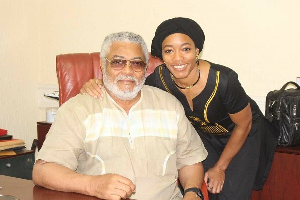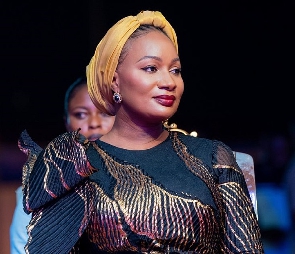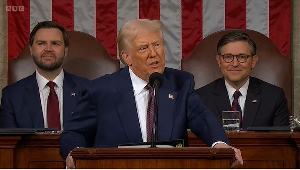In November 2013, Ghana received a yellow card from the European Union (EU) for failing to fulfil its international obligations to combat illegal fishing.
The warning prompted new policies and laws, a plan of action to eradicate illegal fishing and reforms addressing management failures in Ghana’s fisheries.
The yellow card was lifted in October 2015 in recognition of progress made.
Two years on, and Ghana’s fisheries are in crisis.
Illegal fishing is rampant, and stocks of small pelagic fish – critical for food security and livelihoods – are collapsing.
We urge Ghana’s decision-makers to take bold and transparent measures to avert this crisis before it’s too late.
The yellow card served as a stark reminder that failure to effectively manage Ghana’s fisheries could lead to a ban on seafood exports to the EU, worth an estimated US$230 million in 2015.
In early February 2018, an European Commission delegation visited Ghana’s Ministry of Fisheries and Aquaculture Development (MoFAD) to assess the progress in addressing illegal fishing as part of an ongoing dialogue process.
The visit comes at a pivotal moment for Ghana’s fisheries. The industry is in steep decline, while destructive fishing practices are on the increase.
The livelihoods of around two million Ghanaians are at risk, as well as the food security of the nation.
Ghana’s 2015-2019 Fisheries Management Plan provides a roadmap for the recovery of these fisheries.
Commitments include the deterrent sanctioning of illegal, unreported and unregulated (IUU) fishing infringements, reducing the number of trawlers and implementing closed seasons for all fishing fleets to ease pressure on over-exploited resources.
Like many others, we welcome the management plan, but consider implementation to be lacking in key areas.
Three years on, and there is no multi-stakeholder committee to oversee implementation of the plan.
Nor has a Fisheries Commission Board been constituted to ensure the smooth implementation of policies.
What is required is more ambitious, transparent and even-handed action to ensure that commitments in the plan are met.
This is largely a question of political will, as demonstrated by the speed and scale of progress following the yellow card.
Enforcement of fisheries laws
Law enforcement must be scaled up to address illegalities across the sector.
Too often, enforcement has targeted illegal fishing by canoes (use of unauthorised nets, light fishing, etc.), but not destructive practices of the industrial fleet.
This undermines the credibility of enforcement and any attempt to encourage canoe fishers to comply with laws concerning fisheries.
As a priority, enforcement must focus on trawlers that harvest fish indiscriminately, before freezing and illegally trans-shipping them at sea to canoes (“saiko”).
“Saiko” is prohibited under Ghana’s 2010 Fisheries Regulations, attracting a fine of up to US$2 million, yet it is on the increase.
In 2017, 62 “saiko” canoes were recorded at Elmina, more than double the 2015 estimate. Some canoes can carry over 40 tonnes of fish, such that “saiko” efforts may equal or exceed landing rates of legal fish.
With trawlers reporting “official” catches of just 175 tonnes per year, it is likely that the majority engage in saiko to remain competitive.
“Saiko” is highly problematic. Trawlers now target fish specifically for trans-shipment, catching juveniles that have not yet reproduced and over-fished small pelagics (sardinella, mackerel, etc.), the key target species of canoe fishermen. “Saiko” floods the market with cheap, poor quality fish, pushing down prices along with income for artisanal fishers.
“Saiko” catches are not recorded in catch statistics, meaning overall harvest pressure is unknown.
This makes effective fisheries management impossible, contrary to Ghana’s Coastal State obligations under the United Nations (UN) Convention on the Law of the Sea.
Tackling saiko is possible at the source. Satellite monitoring can inform enforcement, while gear restrictions can regulate the capture of non-target species.
Inspections in port and on-board observers can ensure restrictions are respected, as well as prohibitions against trans-shipment.
Enhancing transparency in fisheries management According to the management plan, the government shall be “accountable and transparent in the management of fisheries resources”.
This is a laudable objective, but the implementation of key measures has lacked transparency. This includes the target of reducing fishing days of the industrial trawl fleet by 50 per cent by the end of 2018.
By the end of 2017, 76 trawlers held licences to fish in Ghana, compared to 107 in 2014.
This reduction is welcome, but represents only a slight decrease from the 84 trawlers licensed in 2011. In 2017, four trawlers entered Ghana’s vessel register that did not hold licences in 2015 or 2016.
It is unclear whether such additions are consistent with targets in the management plan.
Closed seasons for trawlers have been implemented in 2016 (November 1 to 30), 2017 (February 1 to March 31) and in 2018 (January 1 to February 28).
These timings lack a clear scientific basis, while their impacts on fish populations are not communicated to the public.
Vessels may fish outside of Ghana during closed seasons, but these authorisations are not published.
During the current closed season, vessels are required to keep their Automated Identification Systems (AIS) operational, even while in port; however, in February 2018, only half of the trawlers were transmitting AIS positions.
This contravenes the conditions of the closure, hampering effective monitoring of vessel activities.
The management plan requires licences to be cancelled for constant IUU offenders.
Yet, vessels with IUU histories received fishing licences in 2017, highlighting the need for transparency in this process, including population of the “Infraction Reports” section of the MoFAD website.
Importantly, most violations are settled out of court; therefore, the deterrent impact of fines is not known. The laws and roadmap for the recovery of Ghana’s fisheries already exist. What is needed is to ensure that they are implemented.
We welcome recent commitments in this regard and will continue to support the government in this fight.
We call on the Presidency of the Republic to make achieving sustainable fisheries a national priority.
*EJF and Hen Mpoano are working in partnership under the EU-funded Far Dwuma Nk?do project to secure sustainable fisheries.
Opinions of Thursday, 15 February 2018
Columnist: EJF and Hen



















